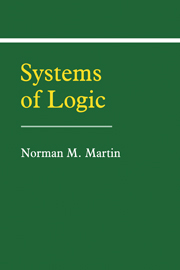Book contents
- Frontmatter
- Contents
- Preface
- 1 Formal Systems and Structure Theory
- 2 Zero-Order Logic: Proof Theory
- 3 Zero-Order Model Theory
- 4 Positive Implication
- 5 Negation
- 6 Complete Implication-Negation Logic
- 7 Disjunction
- 8 Conjunction
- 9 Multi-Connective Systems
- 10 Strict Implications: Introduction
- 11 Strict Implications: Additional Results
- 12 Quantification and First-Order Logic
- 13 Quantification and Complete Logics
- 14 Quantification and Incomplete Logics
- 15 Interpretation of Formal Systems
- Appendix: Historical and Bibliographical Remarks
- Subject Index
- Index of Systems
- Index of Symbols
15 - Interpretation of Formal Systems
Published online by Cambridge University Press: 12 March 2010
- Frontmatter
- Contents
- Preface
- 1 Formal Systems and Structure Theory
- 2 Zero-Order Logic: Proof Theory
- 3 Zero-Order Model Theory
- 4 Positive Implication
- 5 Negation
- 6 Complete Implication-Negation Logic
- 7 Disjunction
- 8 Conjunction
- 9 Multi-Connective Systems
- 10 Strict Implications: Introduction
- 11 Strict Implications: Additional Results
- 12 Quantification and First-Order Logic
- 13 Quantification and Complete Logics
- 14 Quantification and Incomplete Logics
- 15 Interpretation of Formal Systems
- Appendix: Historical and Bibliographical Remarks
- Subject Index
- Index of Systems
- Index of Symbols
Summary
In the preceding, I have attempted, and I trust generally succeeded, to present a body of information and technique concerning logical systems without grinding any philosophical axes (I suppose I have as many of these as anyone). In this final chapter, I shall discuss the bearing of some of the results and the significance of this type of study, and here I shall make no promises to restrain myself concerning philosophical implications.
At first sight it might seem quite reasonable to take the position that a subject as esoteric and mathematical as the formal study of logical systems probably has no philosophical implications at all, just as I suppose most people interested in philosophy would be inclined to say that the theory of partial differential equations or the theory of the multiple integral does not. Indeed, many philosophers, particularly of the so-called ‘ordinary language’ tradition, have taken such a position with regard to formal logic. I feel that I cannot concur, for reasons which I hope will be made clear in the succeeding pages.
There are several significant aspects to the study of formal systems. While one can examine them in other ways, I shall consider them in order of decreasing formalism.
One obvious use, actually of surprisingly general importance to many logicians, is that these systems can be interesting in themselves, that is to say as an intellectually challenging game, somewhat in the way chess and multi-dimensional tic-tac-toe are.
- Type
- Chapter
- Information
- Systems of Logic , pp. 294 - 302Publisher: Cambridge University PressPrint publication year: 1989



